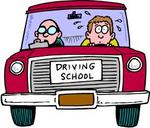 Lawmakers in Indiana are puzzled by a new study showing that students who take driver’s ed classes are four times more likely to be involved in a car accident than those who don’t take the classes and instead merely take the license exam.
Lawmakers in Indiana are puzzled by a new study showing that students who take driver’s ed classes are four times more likely to be involved in a car accident than those who don’t take the classes and instead merely take the license exam.
The study has led some lawmakers to propose that driver’s ed classes be overhauled. The curriculum has not been changed in 30 years.
The study seems counterintuitive but it’s easy to think of a few reasons why it might be true:
1.) The students who can afford to pay for driver’s ed classes are wealthier on average than the students who don’t take the classes and therefore are likelier to own their own car, leading them to rack up more mileage and causing them to be involved in more car accidents. The students who don’t take driver’s ed are poorer on average and therefore have less access to cars, causing them to be involved in fewer car accidents.
2.) The students who can’t afford to take driver’s ed worry that they are lesser-prepared than their driver’s ed counterparts and overcompensate by logging more hours practicing with family members or other (free) driving instructors. (This could easily be the case in a state like Massachusetts where driver’s ed only requires twelve hours of behind-the-wheel time. In Massachusetts, however, driver’s ed classes are mandatory for all drivers under eighteen.).
3.) Driver’s ed programs self-select for bad drivers: the students who enroll in driver’s ed are students who realize they need it. Driver’s ed coaches them up but doesn’t bring them to the same level as peers with better driving abilities (the least plausible explanation).
This blog is maintained by the Boston car accident lawyers at The Law Office of Alan H. Crede, P.C. It does not contain legal advice nor should you construe it as offering you legal advice in your case.
